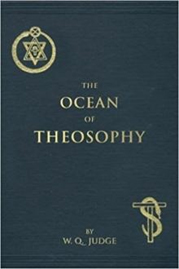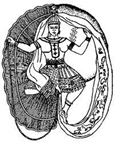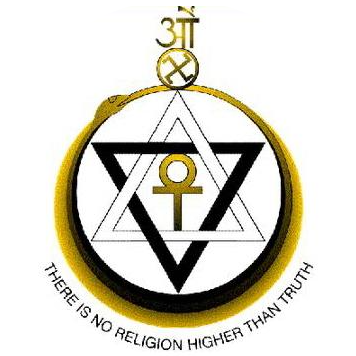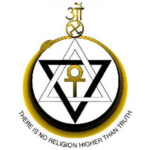Books by William Q. Judge
The need for a simple, concise statement of Theosophical teachings was met by Mr. Judge in all his
books, articles and talks. The Ocean of Theosophy helps us to begin our study of The Secret Doctrine.
With clarity, Mr. Judge explains reincarnation, karma and cycles, giving direction to our own evolution.
His rendition of the Bhagavad Gita, song of the soul and Patanjali’s Yoga Aphorisms gives a true basis
for understanding our psychology, our inner life. From his writings we can become aware of who we are
as the spiritual pilgrim and begin our journey of self effort to evolve better forms of body and mind in
the lives ahead. His sharing of ideas with students, in Letters That Have Helped Me, brings
Theosophical concepts down to practical application in our daily lives.
“The earnest student will do well o study conjointly the writings of H.P. Blavatsky and Wm. Q. Judge;
from them he will learn Theosophy pure and simple; will recognize the community of knowledge and
complete accord that existed between them and will more fully appreciate the mission and nature of
those two Personages.”
Robert Crosbie
The Ocean Of Theosophy
The need for a simple, concise statement of Theosophical teachings was met by Mr. Judge with publication of this book in 1893. It first appeared as a series of newspaper articles, in which the writer set forth all the major doctrines of the philosophy, dealing with questions that might naturally occur to the average reader. Years of experience in the use of the Ocean as a text in Theosophical study classes have proved it a provocative approach to the Theosophical philosophy as a whole. It has 153 pages.
Answers to Questions on the Ocean of Theosophy is also available.


The Scope of Reincarnation
To understand Reincarnation, it must be studied. So many misconceptions on this law abound. This law is part of how the universe evolves and with the law of karma, shows men and women who they are within the manifested world and the important role they play in their relationship with Nature. Nature and Mankind evolve together.
| Who and What Reincarnates? | Why Reincarnation? |
| Karma-An Absolute Law | The World and Man |
| Higher and Lower Manas | The Permanent Individuality |
| First Halt after Death – Kama Loka | The Process of Death and After |
| Significance of Cycles in Evolution | Potentialities of Man and Nature |
The Bhagavad Gita
There are many translations of this Hindu scripture, but few, if any, can compare in either philosophical clarity or literary excellence with this rendition by Mr. Judge.
The Bhagavad-Gita is often called the Bible of India. It is a portion of the Mahabharata (the great Hindu epic) and is recognized as embodying the highest and noblest truths of Eastern religious philosophy. It can be read in seven different ways, one being as a historical event, and the other as the psychology of the soul. The inward struggle of each human being.
I establish the Universe with a portion of myself and remain separate.

Notes on The Bhagavad Gita
These "Notes" are a companion to the Gita. Mr. Judge wrote seven of the articles. These, however, constitute more than half of the volume, the remaining chapters being written by Robert Crosbie, an associate and student of Mr. Judge.
Letters That Have Helped Me
In the early days of the Theosophical Movement in the United States, Mr. Judge was in intimate contact with American students, with whom he maintained a large correspondence. Letters That Have Helped Me is a compilation of his counsels. Mr. Judge's wise and gentle words are a revelation of his understanding of the subtleties of human nature, and of the great depth and strength of heart he possessed as a teacher and a friend.
Part II is comprised of letters to students and Theosophical groups, and various extracts. In this edition of Letters That Have Helped Me, issued 50 years after the passing of Mr. Judge, a third section presents additional material, including a group of allegorical stories contributed by Mr. Judge to the Path.
Patanjali's Yoga Aphorisms
This ancient treatise on self-control - sometimes called "Yoga" - is useful only to students with a thorough grounding in the Theosophical philosophy, for such knowledge on the part of the reader is assumed throughout. To this rendition of the Aphorisms of Patanjali, Mr. Judge has added brief explanatory paragraphs following many of the verses.
Forum Answers
The Theosophical Forum, a pamphlet-like periodical, was launched in April, 1889, and issued monthly thereafter to members of the Theosophical Society in America. It presented answers to Theosophical questions, written by various persons, and was sent without charge to branches and members. Only the replies by Mr. Judge (those which can be clearly identified) are included in this book, arranged in the sequence in which they originally appeared in the Forum, from May, 1889, through February, 1896.

